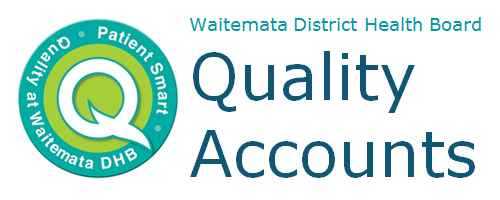Health targets are a set of national performance measures specifically designed to improve the performance of health services.The targets are determined by the Minister of Health and reviewed annually to ensure they align with government’s health priorities. Three of the six targets focus on patient access, and three focus on prevention.
The health targets provide a focus for action, forming part of our Board's set of top 10 priorities. The impact the targets make can be measured to see how they are improving health for our population.
Shorter Stays in Emergency Departments
 95 percent of patients will be admitted, discharged, or transferred from an emergency department (ED) within six hours. The target is a measure of the efficiency of flow of acute (urgent) patients through public hospitals and home again.
95 percent of patients will be admitted, discharged, or transferred from an emergency department (ED) within six hours. The target is a measure of the efficiency of flow of acute (urgent) patients through public hospitals and home again.

Improved Access to Elective Surgery
 The volume of elective surgery will be increased by at least 4000 discharges per year. Each DHB has negotiated local targets taking into consideration the health needs of their communities. Collectively these targets contribute to a national increase in elective surgery discharges.
The volume of elective surgery will be increased by at least 4000 discharges per year. Each DHB has negotiated local targets taking into consideration the health needs of their communities. Collectively these targets contribute to a national increase in elective surgery discharges.
From quarter one 2015/16 the target now includes elective and arranged in-patient surgical discharges, regardless of whether they are discharged from a surgical or non-surgical specialty (excluding maternity).

Faster Cancer Treatment
 85 percent of patients receive their first cancer treatment (or other management) within 62 days of being referred with a high suspicion of cancer and a need to be seen within 2 weeks by July 2016, increasing to 90 percent by June 2017.
85 percent of patients receive their first cancer treatment (or other management) within 62 days of being referred with a high suspicion of cancer and a need to be seen within 2 weeks by July 2016, increasing to 90 percent by June 2017.
Note: This target replaced the previous target of "Shorter Waits for Cancer Treatment" from Q2 2014/2015.

Increased Immunisation
 95 percent of infants aged eight months will have their primary course of immunisation (six weeks, three months and five months immunisation events) on time.
95 percent of infants aged eight months will have their primary course of immunisation (six weeks, three months and five months immunisation events) on time.

Better Help for Smokers to Quit
 95 percent of hospital patients who smoke and are seen by a health practitioner in a public hospital are offered brief advice and support to quit smoking.
95 percent of hospital patients who smoke and are seen by a health practitioner in a public hospital are offered brief advice and support to quit smoking.

Raising Healthy Kids
 95 percent of obese children identified in the B4 School Check programme will be offered a referral to a health professional for clinical assessment and family-based nutrition, activity and lifestyle interventions by December 2017.
95 percent of obese children identified in the B4 School Check programme will be offered a referral to a health professional for clinical assessment and family-based nutrition, activity and lifestyle interventions by December 2017.
Note: This target replaced the previous target of "More Health and Diabetes Checks" from Q1 2016/2017.

Quality & Safety Markers
The Health Quality & Safety Commission (HQSC) is driving improvement in the safety and quality of New Zealand's health care through its quality improvement programmes.
Quality and safety markers (QSMs) will help us evaluate the success of the programmes and determine whether the desired changes in practice and reductions in harm and cost have occurred.
The QSMs are sets of related indicators concentrating on specific areas of harm:
- falls
- healthcare associated infections:
- central line associated bacteraemia (marker retired in December 2014)
- hand hygiene
- surgical site infection (cardiac and orthopaedic (hip and knee arthroplasty) surgeries)
- safe surgery
- medication safety
HQSC Markers
Apr-Jun 2017 Results
Falls
95% older patients assessed for falls risk
Falls
97% older patients assesses as significant risk of falling with an individualised care plan
Healthcare Associated Infections
86% of compliant hand hygiene moments
Jan-Mar 2017 Results
SSI Orthopaedic Surgery
94% hip/knee arthroplasty procedures had antibiotic admistered in right time
SSI Orthopaedic Surgery
96% right antibiotic in right dose (cefazolin or cefuroxime)
Safe Surgery
96% of audits where all components of surgical safety checklist reviewed


